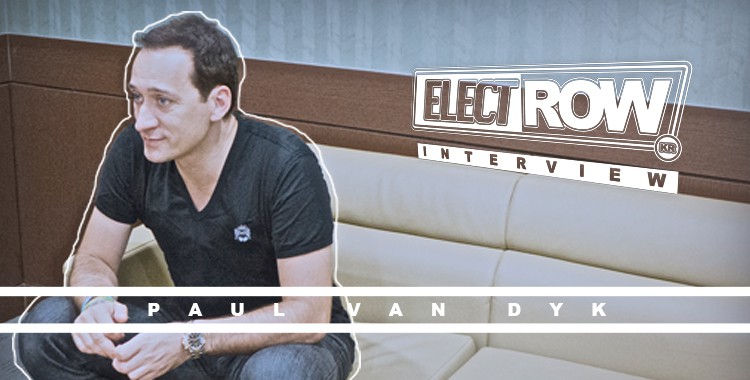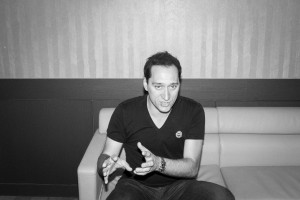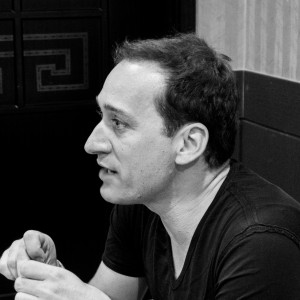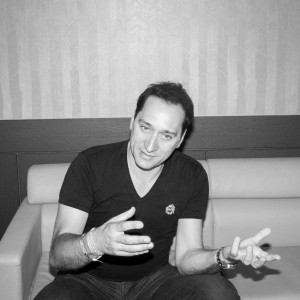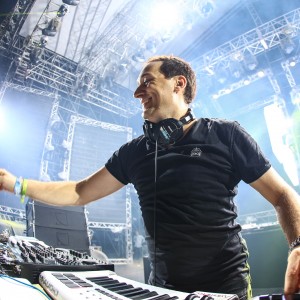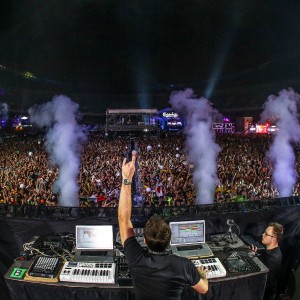He is without question one of the most dominant DJ’s ever in EDM. He stands as one of the longest running top-10 DJ’s by DJ Mag – an astounding 15 years, as of 2011. His consistency at the pinnacle of EDM is hard to fathom, and stretches into TV soundtracks, movie soundtracks, and video games. His career thus far spans 23 years! He has performed in Korea more than ten times, not including tonight’s show for UMF Korea.We were lucky to squeeze this one in. Paul van Dyk was relaxed, welcoming, and gave a very candid and thoughtful interview to us in his VIP suite barely 30 minutes before his first appearance at Ultra Festival Korea on the Main Stage. After meeting him and his longtime lighting/video fabricator, Chris Moylan, we settled in for as much as we could get from thisliving legend. He shared some deep thoughts on the source of authenticity, being able to bring it across, some sage advice for the up-and-comers, and a lament for the older gear. He also spoke of his desire for Korean unification, and Germany’s reunification history.We shared a quick toast of German champagne and sent the maestro on his way upstage– pumped up on ELECTROW energy.
Interview
Elect Row: Paul, thank for your time and welcome to Korea and ELECTROW magazine! Our readers and followers will be pumped up to know that you spoke with us directly. We know you are originally from East Berlin, and we have recently run an article on some Berlin Wall artifacts brought here to Korea, so we’d like to offer that to you as something you might like to read as a connection between Germany and Korea and how we are trying to foster unification here on the peninsula.
Paul van Dyk: Well, very obviously I’m looking at the North and the South Koreans, sort of, situation very closely, because you know, I grew up you know, for me, it was east and west, and for you guys its north and south. And I hope all this nonsense, these political barriers that people put up, in between human beings and societies. And those barriers are gonna break down eventually. And everybody, actually, has the right to live, you know, and, in a proper democratic society.
ER: Yes, and we think that anytime we can join those thoughts and energy with things happening here – it’s just so frustrating to make any progress – towards those ideas and circumstances to move along and become more real, then that is goodness for the world, for sure.
PvD: No, absolutely. I mean it’s like the thing is, obviously the reunification of Germany came from the inside of East Germany, it’s not like the West came progressing towards it, it was like, more like the opposite. If you really look at the history, West Germany used East Germany very well as a cheap labor country. And so, you know, history isn’t always black and white.
ER: Yes, there’s several layers. Right, well let’s get to the music stuff! We know that you take inspiration from things going on in everyday life, so what is inspiring you now, these days?
PvD: Well obviously, right now, very straight, very straightforward. It’s like the, the Ibiza season just started, we just came straight in from Ibiza, it was absolutely fantastic, the last show. And so that’s always very inspiring, a lot of energy on the island, of course. I’m just in the final phases of the new album, so that’s very exciting. And then of course, all the big festivals all over the place…it’s always good to be a part of it.

ER: Are you staying in Asia for a bit, or are you leaving the Asian region?
PvD: No, we’re going to Beijing tomorrow and then we’re going straight back to Ibiza after that.
ER: Has there ever been a moment when you had an idea for song or track and it was just at the wrong time, just awkward and too funny trying to capture it somehow?
PvD: Well there was a time, when it was before iPhones, and I was messing around with a voice recorder, and just like, singing a melody into it, like in, when I had an idea, and usually it sounded really horrible. And I never really knew ‘what did I mean?’…so I stopped troubling with that voice recorder.
ER: A hand-held mic. And then you were taking that home? And…
PvD: Yeah, and then I would try to come up with, ‘what the…heck was I thinking?’…so, it never worked. And so I decided to stop focusing on the full melodies and more on the feel, of the moment, and trying to bring that across, while working on a piece of music.
ER: You mentioned feel again right there…that’s obviously a big part of it. So how long does it take to capture that feeling, how many times does it take to get that feeling right?
PvD: Well, it’s like, it’s different every time. I mean, sometimes it goes like really quick, it’s there right away. And other times you just like, work for weeks on a piece, and you can decide its crap. But then, it just happens, it’s a creative process, and you can’t force it. It’s like, something, when you’re not producing after a commercial formula, or just like, reproducing something that is in the Top-10 and popular, and…then you end up in a place where, you know, sometimes you challenge yourself, kind of like finding that one-thousandth percent moment, to bring it across. And then, you cannot say it takes, a day, sometimes it takes even longer.
ER: So that dynamic moment when you’re trying to capture it…
PvD: It’s not even just like nabbing it, it’s also like, it’s also quiet moments of making music. It’s like, you know, to really kind of sit down and to bring something across. I remember when I watched Schindler’s List for the very first time. I was really, really sad. And I went to the studio and I started working on something. And…ahhh…it took me one-and-a-half years to finally actually finish the piece, because it’s like, you know, I’m a very happy, optimistic person, and so, to come down to this really intense set moment again and to kind of like re-feel it, and make to actually make a piece of music of it, wasn’t really easy, but it was a very important piece of music for me, so I wanted to actually sort it out.
ER: [large POP!! in the background…ER] That sounded good! Was it what I think it was?
PvD: Yep! Ay-yai-yai…

ER: In our next issue, we will be providing tips to up-and-coming DJ’s and producers from very strong producers here on the peninsula. Can we ask you to provide one or two tips that we can dovetail in with this piece? We know that you are very strong on authenticity…
PvD: Well, that’s a key point. If you have something inside of you that you sort of want to express…if it’s like, writing a book, or doing a painting, or doing photography, or in my case, I’m making music…ahhh, again, focus on what you really feel, focus on what you really believe is the way forward for yourself, because that’s the only way to do something that’s unique, that’s only you. Otherwise you’re going to end up maybe copying something that you saw somewhere, that you read somewhere, or, in the case of music, that you heard somewhere.
ER: And when you refer to authenticity, you are talking about the genuine-ness if its originality.
PvD: Yeah…I mean, the thing is, you know, it is, it is absolutely okay to be inspired by something. But it’s like, a great artist out there…ahh, would be an absolute less famous thing to say that I’m not inspired by great artists, like Depeche Mode, as an example. But then again, my music doesn’t sound anything like Depeche Mode, because it’s like you know, I took what they gave me, and made it my own, made it something that is me. And that’s what creativity is, this is what an artist is, because just copying something would never be satisfying for me.
ER: We’ve witnessed maybe a few acts in this genre, but we don’t need to go into that. I think I’m pretty clear on the use of inspiration to help you be original and authentic to yourself.
PvD: Yeah, but the thing is, this is important. It almost comes down to the point like, ‘why are you doing what you’re doing?’ And just like, OK, why is somebody a DJ in 2014 versus being a DJ in the year 1990? When I started, and it sounds kind of funny, but if you think of what it actually means, it really comes down to the point, the DJ was the freak in the corner while the other people had fun. It was actually about, it was like, do I to eat something or am I going to buy this record? It was like that.
ER: It was like that for you.
PvD: It passion for the music, not just for me…for many of my colleagues, from like, Carl Cox to Sasha, to all, we all went through this phase – there was no money, there was no fame, nothing assuch – it was pure passion for music. So if you look at some of the kids that are out there right now, it’s like, I mean, if you ask them, ‘why are you doing what you’re doing?’, then you get a very different answer. And, it’s a different approach, I guess, a different passion.
ER: Well you have certainly been a very powerful inspiration for many, no question about it. We can all be grateful for that. Can I ask you about the equipment and the gear again? Where do you sit with the progression of the gear used in EDM? Do you wish for some features that are no longer used or have been replaced?
PvD: Well first of all, is, I think it’s always about creativity. Because like, if you listen to some of the stuff that people produced in the early days of computers and electronic music, it’s just kind of like WOW, it sounds actually really, really awesome! And then you see that they had like, an old Atari ST-1224. This is how I started. And then you see, now you have those notebooks, and those softwares, and those synthesizers and you have everything, and it’s just like, you press, and there’s a great sound there already. I remember all this really hard-sounding electro stuff, you know, we created ourselves! I remember putting a guitar jack into a guitar distortion [box…ER], and then when you hold the jack, you see, you short-cut this thing [short-circuit…ER], and it makes the sound, – it makes this ‘aaananaannnnnnnnn’ – we sampled it and tuned it to a note, and then we’re able to play it. But those sounds, now, they just come, like, [snap!] that! – pretty much with every pre-set synthesizer these days. Again, this is when you live and feel every single sound and element that you put into the music. And in terms of like, the equipment – of course it had an amazing important influence on what electronic music is – starting from the 303 and the 909 [ref to the Roland Juno 303 and 909 Synthesizers…ER] sort of like, the early days, to you know, everything we see these days, that actually people are using onstage. And for me it was always important to take that technology actually on stage. As soon as it was possible to take production elements onto the DJ’ing, the DJ stage facilities, it was like, this is what I did. ‘Til the point now that I‘m now basically playing live with my keyboards and computers and all those controllers that I’m using. That’s my approach to it. A lot of other people have a different view on it, a different approach to what’s going on, but that how I see it, and this is how I do it.
ER: Did the two camps of European music after WWII have any influence on you, the French in Paris and the Germans in Cologne?
PvD: The thing is, I‘m not even going back that far and being so analytical about it. There was music that I liked and music that I didn’t like. So looking back now I realize that okay, there was already a lot of music that was actually already very electronic sounding. At the same time, I was one of the biggest fans of a band called the Smiths, which is purely guitar music. So it really is about a feel, it’s about something that’s coming across. I didn’t speak a word of English when I was a big Smiths fan. it was just the music that inspired me. It was something that made me feel like, yeah, so I’m a young, fucking rebel.
ER: You talk about wanting to learn to be a guitarist like Johnny Marr of the Smiths.
PvD: Still, you know, listening to this music [the Smiths…ER], is like, I don’t know, there’s so much going on, and it’s so inspiring because, apparently it’s like all those different elements, they almost seem not to…work together, but then they really work together. It’s like Morrissey was always singing against any melody Johnny Marr was playing on the guitar, and it still was like, WOW! it was enlightenment, sort of, if you want to call it that. It was interesting and new and special.
ER: I was influenced a lot by the Cure.
PvD: Sure, of course, yes, that too. It was like, I don’t know, in the 60’s or 70’s, you either were Rolling Stones or Beatles, and in Berlin, it’s either the Smiths or the Cure. So, I was the Smiths, less the funny haircuts! I still love them, you know, monstrous, masterpieces forever, they just stand out.
ER: Jarre, Jean Michel Jarre, can I ask about his influence?
PvD: Well, of course the soundscapes that he created, were some sort of inspiration, but they, he was like more of like, a theatric director. It wasn’t so much about the music as it was about this whole laser show, and this whole…some kind of Paris thing, and the music was like this element of his whole artistic view. It’s very unique, very special, I mean, definitely props up to the guy, he’s done something amazing. At the same time, I think music was just a part of something that he wanted to do. For me it’s always music first and then comes the other stuff. And lucky enough, I have one of the best video and light directors, in the world, with me, so, whatever I passionately do musically, he’s capable of actually creating, on the screen and on the stage.
ER: Awesome. Well, I think that’s a lot of your time and I will thank you for all of it, very much. Can we take pictures?
PvD: Of course, of course.
Dr. Dave

